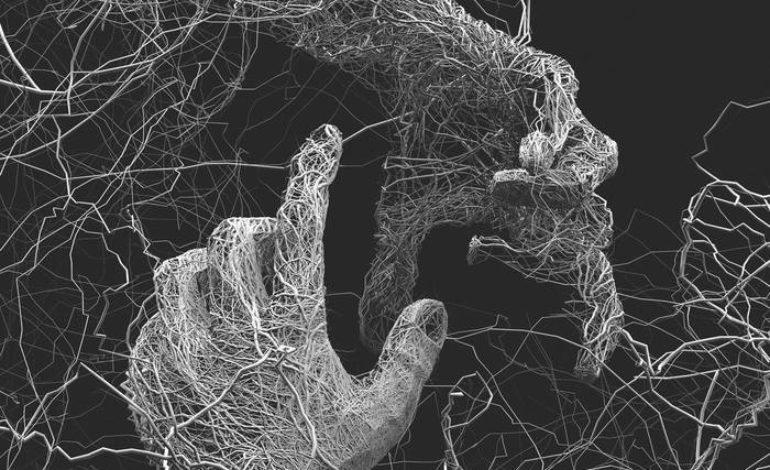

Massive expectations from a heavy music dream team falls short on originality
Umbra Vitae, metal’s newest supergroup of epic proportions and expectations, present a lukewarm release on their 26-minute debut, Shadow of Life. Albeit heavy, raw and calculated, like many of the adjacent bands associated with Umbra Vitae in sound and even personnel, there is so much to be desired.
Jacob Bannon, Mike McKenzie and Sean Martin (all members of industrial band Wear Your Wounds), enlisted the aid of ex-The Red Chord bassist Greg Weeks and ex-Job For A Cowboy drummer Jon Rice to form Umbra Vitae, named after the Georg Heym poem. Looking for a means to express their musical ideas much more aggressively, the personnel on Shadow of Life aimed to create an “unrestrained musical effort.” Although the chaotic nature of the music and songwriting certainly succeeds in feeling unrestrained and unhinged, the end result is unimpressive.
The first track, “Ethereal Emptiness,” immediately conveys its mission statement in the beginning riff alone. Elements of all the bands involved in the project are obvious, with low, chugging breakdowns that lead into and bookend dizzyingly fast blast beats and guitar leads. These elements are all portrayed in the following track, as well.
The first single, “Mantra of Madness,” has a more consistent songwriting structure compared to the preceding tracks and some of the shorter songs on the album. It builds around a sludgy guitar riff that trails off into an extremely fast section, and then an extremely slow breakdown, until repeating once again, fading off to the end. “Fear is a Fossil” is also built around a groovy, sludgy guitar riff and backing vocal tagline that acts as a sort of chorus. The slower middle section demonstrates some fantastically devastating, arpeggiated guitar chords and chugging, before ending with the aforementioned vocal tagline. It goes by quick as one of the shorter and more straightforward songs on the record.
“Polluted Paradise” and the first half of “Intimate Inferno” showcase the true anger and brutality that is Shadow of Life, harkening back to mid-2000’s deathcore, pioneered by Rice himself in his Job For A Cowboy days. The track is bookended with a double-bass groove that sounds like it could have easily been released in 2005 (and that’s not necessarily a bad thing). The second single, “Return To Zero” is easily the most uninspired track, blending elements of old school death metal and chaotic hardcore, yet doing it a manner that fails to distinguish itself from the preceding songs.
The final two tracks are the longest but most worthwhile tracks, with some extremely compelling and impressive instrumental and vocal performances by Bannon and company. The chugging, caveman riff in “Blood Blossom” compliments the atmospheric, black metal-sounding chords used in the verses particularly well, but does not end up breaking away from the stagnant songwriting structure found on the rest of the record, with the exception of the pointless ending guitar solo/lead section that lasts about 15 seconds.
The final track, “Shadow of Life,” is the longest but most confusing song on the album in terms of performance and songwriting. Continuing on with the ringing, black metal-esque chords demonstrated in “Blood Blossom,” the track doesn’t cover much ground musically that hasn’t been heard on the rest of the album, except for the noisy screaming sample and technical chugging riffs that are used for dynamics rather than just another breakdown, which is incredibly refreshing. However, the closing minute is an instrumental solo section that takes almost a full 45 seconds to fade out.
Despite seemingly everything going for the album, such as the amazing personnel, artwork, background and the band’s desire to play heavy music, Umbra Vitae’s Shadow of Life is unimpressive in quite a few regards. The songwriting is not versatile at all, lacking ingenuity. The revival of 2000’s deathcore and metalcore in combination with newer sounds is beautifully executed by contemporary bands such as Vein, Code Orange, Knocked Loose and Jesus Piece, all filled with the same capacity for brutality and raw power that Umbra Vitae do. However, those bands are able to make a name for their own brand of heavy music and succeed where Umbra Vitae fail.
Knowing full well how important the background of Umbra Vitae is, it is upsetting to walk away from Shadow of Life feeling unimpressed. This is not to say that the performances or production are not on par, with Kurt Ballou (Converge) mixing the band with such clarity and excellence that there is no room for unnecessary overdubbing, and the guitar work and drumming overall being highly impressive in endurance, power and technical ability. The biggest qualm is the failed attempt at bringing anything new to the deathcore genre. Shadow of Life doesn’t come off with the same energy that other contemporary bands do, or even with the same passion that the members have in their own respective bands.
Despite the ingenuity and weak songwriting, any fan of Myspace-era deathcore (Job For A Cowboy), spastic metal (Twitching Tongues, The Red Chord), or even good-old fashioned ’90s hardcore (Converge, Hatebreed), should heavily consider listening to Umbra Vitae’s Shadow of Life due to its amazing personnel and brief, 26-minute run time alone.
